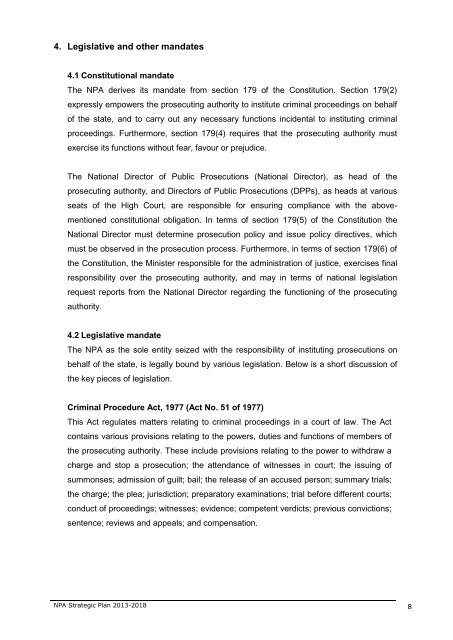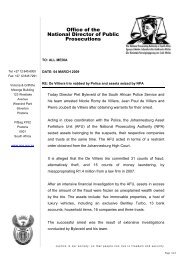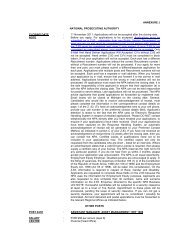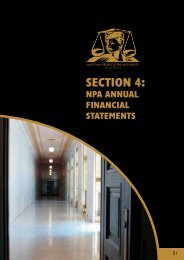NPA Strategic Plan 2013 - 2018 - National Prosecuting Authority
NPA Strategic Plan 2013 - 2018 - National Prosecuting Authority
NPA Strategic Plan 2013 - 2018 - National Prosecuting Authority
Create successful ePaper yourself
Turn your PDF publications into a flip-book with our unique Google optimized e-Paper software.
4. Legislative and other mandates<br />
4.1 Constitutional mandate<br />
The <strong>NPA</strong> derives its mandate from section 179 of the Constitution. Section 179(2)<br />
expressly empowers the prosecuting authority to institute criminal proceedings on behalf<br />
of the state, and to carry out any necessary functions incidental to instituting criminal<br />
proceedings. Furthermore, section 179(4) requires that the prosecuting authority must<br />
exercise its functions without fear, favour or prejudice.<br />
The <strong>National</strong> Director of Public Prosecutions (<strong>National</strong> Director), as head of the<br />
prosecuting authority, and Directors of Public Prosecutions (DPPs), as heads at various<br />
seats of the High Court, are responsible for ensuring compliance with the abovementioned<br />
constitutional obligation. In terms of section 179(5) of the Constitution the<br />
<strong>National</strong> Director must determine prosecution policy and issue policy directives, which<br />
must be observed in the prosecution process. Furthermore, in terms of section 179(6) of<br />
the Constitution, the Minister responsible for the administration of justice, exercises final<br />
responsibility over the prosecuting authority, and may in terms of national legislation<br />
request reports from the <strong>National</strong> Director regarding the functioning of the prosecuting<br />
authority.<br />
4.2 Legislative mandate<br />
The <strong>NPA</strong> as the sole entity seized with the responsibility of instituting prosecutions on<br />
behalf of the state, is legally bound by various legislation. Below is a short discussion of<br />
the key pieces of legislation.<br />
Criminal Procedure Act, 1977 (Act No. 51 of 1977)<br />
This Act regulates matters relating to criminal proceedings in a court of law. The Act<br />
contains various provisions relating to the powers, duties and functions of members of<br />
the prosecuting authority. These include provisions relating to the power to withdraw a<br />
charge and stop a prosecution; the attendance of witnesses in court; the issuing of<br />
summonses; admission of guilt; bail; the release of an accused person; summary trials;<br />
the charge; the plea; jurisdiction; preparatory examinations; trial before different courts;<br />
conduct of proceedings; witnesses; evidence; competent verdicts; previous convictions;<br />
sentence; reviews and appeals; and compensation.<br />
<strong>NPA</strong> <strong>Strategic</strong> <strong>Plan</strong> <strong>2013</strong>-<strong>2018</strong> 8

















